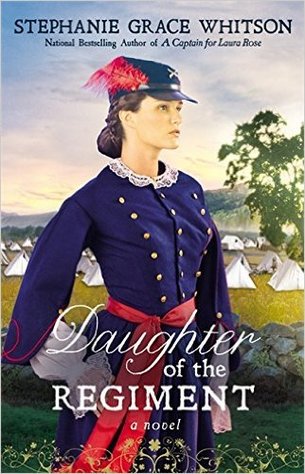 Interview by Ashley Eastman Featuring Daughter of the Regiment Irish immigrant Maggie Malone wants no part of the war. She'd rather let "the Americans" settle their differences—until her brothers join Missouri's Union Irish Brigade, and one of their names appears on a list of injured soldiers. Desperate for news, Maggie heads for Boonville, where the Federal army is camped. There she captures the attention of Sergeant John Coulter. When circumstances force Maggie to remain with the brigade, she discovers how capable she is of helping the men she comes to think of as "her boys." And while she doesn't see herself as someone a man would court, John Coulter is determined to convince her otherwise. As the mistress of her brother's Missouri plantation, Elizabeth Blair has learned to play her part as the perfect hostess—and not to question her brother Walker's business affairs. When Walker helps organize the Wildwood Guard for the Confederacy, and offers his plantation as the Center of Operations, Libbie must gracefully manage a house with officers in residence and soldiers camped on the lawn. As the war draws ever closer to her doorstep, she must find a way to protect the people who depend on her. Despite being neighbors, Maggie and Libbie have led such different lives that they barely know one another—until war bring them together, and each woman discovers that both friendship and love can come from the unlikeliest of places. “Whitson celebrates the strong but unknown heroines who marched off to war with their men, as well as those who maintained the home front in this Civil War-era inspirational—based on true events, Daughter of the Regiment will capture the hearts of historical fiction fans.” --Publishers Weekly Ashley: What was behind your desire to write Daughter of the Regiment? Stephanie: Loving history means I’m always reading history. Being a woman of faith means I’m generally seeking the women’s side of historical events and asking myself how they managed to survive a dramatic event or a particularly difficult time. I learned about the real Daughters of the Regiment while reading about women in the Civil War, and the moment I “met” some of those women, I knew I wanted to celebrate their contribution. Ashley: Who are the main characters in the book? Stephanie: Maggie Malone is an Irish immigrant who really doesn’t want to have anything to do with the north/south conflict. In her opinion, her two brothers should “let the Americans settle it.” But then an Irish Brigade is formed in St. Louis, and Maggie’s brothers volunteer. She’s thrust into the middle of the conflict in a very personal way and forced into situations that challenge her idea about her own identity, both as a woman and as an immigrant. Elizabeth Blair is the mistress of her brother’s plantation in the part of Missouri known as Little Dixie. She’s been thrust upon him because of the death of her parents, and he sees her as little more than a tool to be used to help him get what he wants, which is political power and status. Like Maggie, Libbie hasn’t ever really questioned her personal place in the world. When her brother forms a volunteer militia and the plantation becomes first a campground and then a field hospital, Libbie is also forced into situations that challenge her idea about her own identity and beliefs. Maggie and Libbie come face to face in the aftermath of a battle. Libbie is looking for her brother among the southern dead, and Maggie is tending the wounded. Ashley: Would you share a fact about each main character that no one else knows? Stephanie: No one suspects that six-foot-tall Maggie Malone who farms and hunts and cares nothing for “feminine pursuits” would love to have a home and a family of her own. No one suspects that Elizabeth Blair, the epitome of a southern lady, feels trapped in a way of life that gives her no personal sense of accomplishment and no happiness. Ashley: In three sentences what is Daughter of the Regiment about? Stephanie: Two women from opposite sides of the social ladder must face events that force them to question everything they’ve been raised to believe about themselves, about God, and about their country. Ashley: Do you outline the entire book before starting, or do you write as you go and let the characters take control of the story? Stephanie: I begin with a compelling character caught up in a moment in time—a moment of real history. The characters always take control of the story, and when they do, I know they’ve become real to me. That’s a very good thing. Ashley: If your book changed as you wrote it, how is it different than how you originally planned? Stephanie: My books always change significantly as I write them. Some of that is because they are character driven and I don’t outline before I jump in. Some of it results from the superb input of my wonderful editor, who always has helpful “big picture” insights. Ashley: How do you believe this story relates to the lives of readers? Stephanie: We should all think through what we believe at a fundamental level about God and about our role in the world. Do we believe those things because we were raised to believe them, or do we believe them because we think they are true truth? Ashley: Expound on the spiritual themes in the book. Stephanie: I don’t generally begin a story with a spiritual them in mind, because I don’t want to force a message or preach a sermon. However, usually about two-thirds of the way through a book, I will have a moment where I realize what the book is “really” about, and that is always a spiritual truth. With Daughter of the Regiment, I realized that both Maggie and Libbie had the same needs from a spiritual point of view. Both women needed to realize who they could become if they let go of fear and stepped forward in faith. They needed to learn that physical circumstances or social standing weren’t really all that important in light of eternity. Ashley: Is this your favorite genre to write for? Stephanie: My heart’s in historical fiction. I’ve written contemporary fiction and enjoyed it, but when I returned to historical fiction, I felt like I’d come home. This is where I belong. Ashley: Why do you think historical fiction is so compelling for you as a writer? Stephanie: The “lightweight” answer to that is that women enjoy dress-up. In fact, historical fiction is sometimes called “women in costume.” I think there’s a more profound reason, though. Meeting women from the past by reading their diaries and reminiscences was a very real encouragement to me back in the 1990s when I was facing an unusually trying time in my personal life. In one calendar year, the beloved family dog/guardian ran away, my husband was diagnosed with an incurable form of cancer, my parents both died within six weeks of each other, my best friend died of breast cancer, one of my daughters became very ill with a life-threatening chronic illness that took months to identify and treat, and my eldest daughter and I were involved in a head-on collision when another driver had a heart-attack and crossed the center line of the rode we were on. During that time of my life, I was reading about pioneer women who lost children and faced other devastating life events and still hung on to their faith in God. Their words reached across time and gave me perspective on my own troubles. That very concrete bond has never weakened. I feel a debt to the women who have gone before and I love telling their stories in the guise of historical fiction. Ashley: What sort of research was required for this book? Stephanie: I probably spend as much (if not more) time researching as I do writing a story. I don’t feel that I can move, feed, or clothe my characters until I’ve done some basic research about the time and place. I can’t understand my characters within the context of their time in history until I’ve read a lot about that time in history. I place imaginary friends into real events. Ashley: How do you strike an enjoyable balance in your book between romance & action? Stephanie: By thinking about the part of the story that will force my characters to grow and change in fundamental ways. Readers of historical fiction in 2015 expect a strong romance thread, so I provide that, but my books are all set in a time and place where “action” is a fundamental part of everyday life. As to “fact and fiction,” the facts provide the setting and many of the events, but the specific characters living those events are products of my overactive imagination (except for the occasional cameo). Ashley: Why did you choose to focus on a female protagonist? Stephanie: I generally focus on the female protagonist because women are my largest target audience. Ashley: Can you give us a hint at the next book in the series? Stephanie: I’m having a great time learning about the Pony Express and putting Annie Paxton and her brothers Frank and Emmet into that exciting, pivotal time of western history. Ashley: How much leeway do you give yourself with facts in a Historical Romance? Stephanie: Not very much, and if I do give myself leeway, I explain exactly what it was and why I did it in a letter to the reader. Ashley: Where do you like to write? Stephanie: I’m blessed to have an office in my home. I’ve surrounded myself with historical artifacts, research books (20 running feet of floor to ceiling bookshelves) and clutter. Ashley: Are you a full-time author? Stephanie: Full time. Ashley: How long does it usually take you to write a single book? Stephanie: Oh, my … that’s a tough one. I like to have at least a year, because with historical fiction there’s so much reading and research involved, but some of my story ideas “percolate” in my mind for years before they actually emerge as published books. Ashley: What are some of the strongest influences on your writing? Stephanie: My passionate interest in women’s history coupled with my love of reading. Ashley: What’s your view on e-books and the new publishing world? Stephanie: It’s an exciting time to be a writer. I appreciate the potential e-books have given writers to find an audience. At the same time, I feel for all the wonderful people who’ve been affected in a negative way by the shake-up in “the way things have always been done.” It’s always difficult for a business to adapt to new technology, and I have dear friends who’ve been negatively impacted by the changes in publishing. Because many of those people are my sisters and brothers in Christ, I feel a burden to pray for them—and to pray for the grace to adjust to what God does in my writing life, as well. The only thing that is certain right now is that nothing’s certain—except, of course, for God’s hand on our lives and our writing ministry. So we are all learning, adapting, losing, gaining—I just saw a Charles Schultz cartoon with Charlie Brown and Snoopy sitting side-by-side. Charlie Brown is saying, “My entire life can be described in one sentence: It didn’t go as planned, and that’s ok.” I think all of us involved in publishing right now are working toward the “and that’s ok” part of that view of life. Ashley: What about you tends to surprise people? Stephanie: That one’s easy. No one seems to expect a woman who spends much of her time learning and writing about the 1800s to enjoy riding a motorcycle. I own a Honda Magna and named her “Kitty” when I first rode her home and my daughter commented on the sound and described it as a kind of “purr.” My husband has his own motorcycle as well—but I had Kitty first. We have a group of church friends who take dinner runs and the occasional longer ride together. My favorite of the latter to date was a trip from our home in southeast Nebraska to Door County, Wisconsin. Ashley: What was your favorite book as a teen or child? Stephanie: Anything with a horse in it. The Black Stallion series by Walter Farley were special favorites, and I can still see the cover of the edition of Thunderhead I carried to my favorite reading spot in a mulberry tree in our back yard. Ashley: What is the one author, living or dead, who you would co-write a book with and why? Stephanie: I’ve already co-written a quilt history book with Kathleen Moore of Austin, Texas. It was a wonderful experience and I’d repeat it if she hadn’t had the gall to move out of my home state of Nebraska. Our book (Home on the Plains: Quilts and the Sod House Experience) required lots of quiltmaking together, and that’s not something that can be done long distance. While I have enjoyed collaborating with other novelists in a couple of novella collections, I don’t see myself co-writing in the normal sense of the term. Ashley: What are your hopes for your future as an author? Stephanie: To continue to provide stories that give hope based on the knowledge that through Christ, we can belong to a personal God who cares about what happens to us and who will walk every valley with us. Ashley: In what ways does your faith impact how you approach writing? Stephanie: I am constantly aware of God’s part in my writing life and convicted by David’s promise, “I will not offer to the Lord that which costs me nothing” (2 Sam. 24). I struggle with finding the balance between writing and living life and I am continually asking God for help with that. Ashley: Coke or Pepsi? Stephanie: Root Beer Ashley: Favorite place to vacation? Stephanie: Paris Ashley: Favorite season? Stephanie: Fall (God’s paintbrush applied to the changing landscape delights me) Ashley: Do you have a particular drink or food you consume when you write? Like coco, raspberry tea, animal crackers? Stephanie: Excellent quality, medium roast coffee. Ashley: Favorite color? That’s changing. It used to be red. Now I think it might be yellow. Ashley: Do you have a favorite Bible verse? Stephanie: My favorites change often, depending on what books of the Bible we are studying in church and what I’m reading on my own. I reference 2 Thessalonians 3:16 when I autograph books: “ … may the Lord of peace Himself continually grant you peace in every circumstance …” Ashley: Favorite pasta dish? Stephanie: Anything served at Angiolino Ristorante in Florence, Italy. Ashley: Do you listen to music while you write? If so, what are some examples? Stephanie: I don’t. I like the silence. My office is in the basement of my Victorian era home. It’s deeper than many basements, with high ceilings and a lovely brick archway through which you pass to access the office. We call it “the catacombs,” and I adore spending time “down there” with my imaginary friends. In silence. Ashley: Thank you Stephanie for giving us such deep insight into Daughter of the Regiment and your writing process. It’s always fun to go deeper into the author’s experience of writing.  Author Website: StephanieWhitson.com Author Blog: stephaniegracewhitson.blogspot.com Author Facebook: Facebook.com/StephanieGraceWhitson-official Author Pinterest: pinterest.com/stephgwhitson/
1 Comment
|
Follow meArchives
May 2024
Categories
All
|






 RSS Feed
RSS Feed